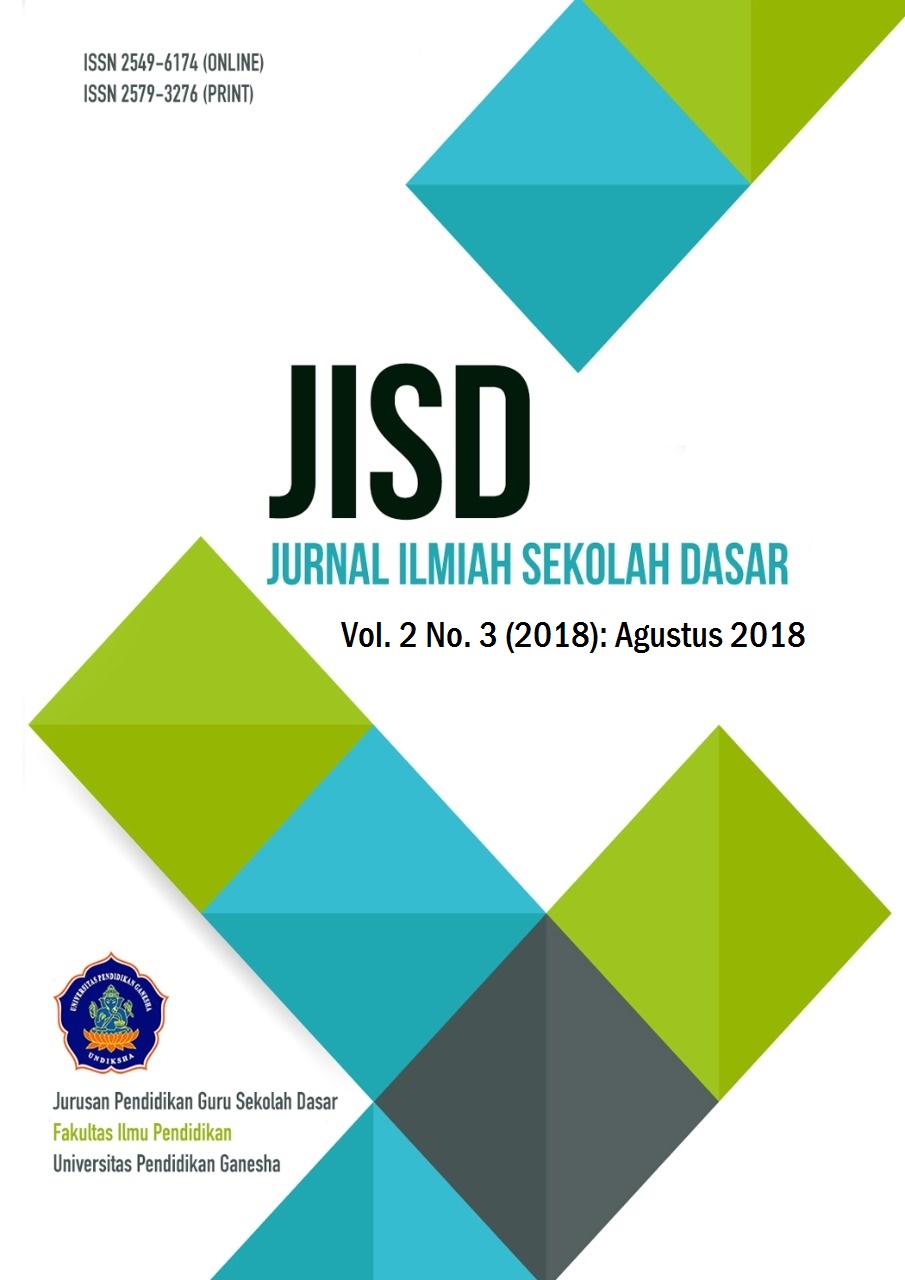Pengaruh Model Pembelajaran Science Environment Technology Society Terhadap Hasil Belajar Ilmu Pengetahuan Alam
DOI:
https://doi.org/10.23887/jisd.v2i3.16149Abstract
The research was purpose to find out the differences on learning result of natural science between group of students who have been taught using learning model science environment technology society and groups of students who have been taught using conventional learning model. This research was study quasi-experiment, with non-equivalent postttest only control group design.Population of this research is all of class V SD in Gugus III Mendoyo Sub-district amounts to 129 person. The sample of this research were class V SDN 8 Penyaringan amounts to 21 personand SDN 1 Penyaringan amounts to 23 person. The sample was determined using random sampling technique. Learning result data was collected using multiple choice test. The data obtained were analyzed using descriptive statistical analysis technique and inferential statistical analysis (t-test). The results show that there are differences of result learning Inatural science between group of students who have been taught using learning model science environment technology society and groups of students who have been taught using conventional learning model class V SD in gugus III Mendoyo subdistrict.This is show by tcount (9,707)> ttable (2,000). Furthermore, the experimental group average (20.98) is greater than the control group mean (14.67). Thus, the science environment technology society learning model has a positive effect on the learning result of IPA in grade V SD students in Gugus III Mendoyo SubdistrictReferences
Fatchan, Ahmad. 2014. Pengaruh Model Pembelajaran Science, Evironment, Technology And Society (SETS) Terhadap Kemampuan Berkomunikasi Secara Tertulis Berupa Penulisan Karya Ilmiah Bidang Geografi Siswa SMA. e-jurnal pendidikan dan pembelajaran volume 21 nomer 1 tahun 2014.
Handayani, Ni L Pt Andry, dkk. 2014. Pengaruh PendekatanScience,Environment,Technology And Society(Sets)MelaluiKerjaKelompokBerbasis Lingkungan TerhadapHasil Belajar IPASiswaKelasVSDN 9Sesetan,Denpasar. Jurnal Volume 2 Nomer 1.Singaraja. Undiksha Singaraja.
Hasanah, Aan dan Mahdian.2013. Penerapan Pendekatan SETS (Science Environment Technology Society) Pada Pembelajaran Reaksi Reduksi Oksidasi.Jurnal Inovasi Pendidikan Sains. Banjarmasin. Universitas Lambung Mangkurat.
Rasana, I Dewa Putu Raka.2009. Laporan SabbaticalLeave Model-Model Pembelajaran. Singaraja: Universitas Pendidikan Ganesha.
Riastini, Putu Nanci., dkk. 2016. Pembelajaran IPA SD. Singaraja. Undiksha Singaraja.
Rusman. 2015. Pembelajaran Tematik Terpadu Teori, Praktik Dan Penilaian. Jakarta: PT RajaGrafindo Persada.
Samatowa, Usman. 2010. Pembelajaran IPA di Sekolah Dasar. Jakarta Barat.Permata Kuri Media.
Sutarno, Nono. 2009. Materi dan Pembelajaran IPASD. Jakarta: Universitas Terbuka.
Widiantini, dkk. 2017. Model Pembelajaran SETS (Science, Evironment, Technology And Society) Berbantuan Virtual Lab Berpengaruh Terhadap Hasil belajar IPA. Jurnal volume 1 Nomer 2.Singaraja. Undiksha Singaraja
Koyan, I Wayan.2012. Teknik Analisis Data Kuantitatif.Singaraja: Universitas Pendidikan Ganesha Press.
Suastra, I Wayan. 2009. Pembelajaran Sains Terkini: Mendekatkan Siswa dengan Lingkungan Alamiah dan Sosial Budayanya. Cetakan Ke-1. Singaraja: Undiksha
Trianto. 2010. Model Pembelajaran Terpadu: Konsep, Strategi, dan Implementasinya dalam Kurikulum Tingkat Satuan Pendidikan (KTSP).Cetakan Ke-2. Jakarta: PT Bumi Aksara.
Jihad, Asep dan Abdul Haris. 2013. Evaluasi Pembelajaran. Yogyakarta: Multi Pressindo.
Downloads
Published
How to Cite
Issue
Section
License
Authors who publish with the Journal Ilmiah Sekolah Dasar agree to the following terms:
- Authors retain copyright and grant the journal the right of first publication with the work simultaneously licensed under a Creative Commons Attribution License (CC BY-SA 4.0) that allows others to share the work with an acknowledgment of the work's authorship and initial publication in this journal.
- Authors are able to enter into separate, additional contractual arrangements for the non-exclusive distribution of the journal's published version of the work (e.g., post it to an institutional repository or publish it in a book), with an acknowledgment of its initial publication in this journal.
- Authors are permitted and encouraged to post their work online (e.g., in institutional repositories or on their website) prior to and during the submission process, as it can lead to productive exchanges, as well as earlier and greater citation of published work. (See The Effect of Open Access)










